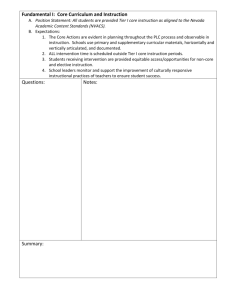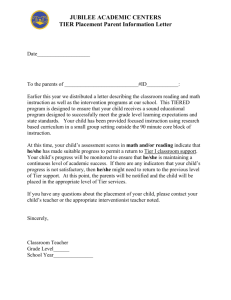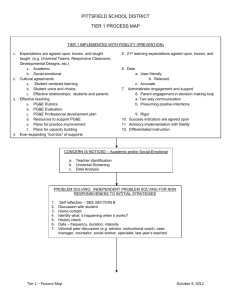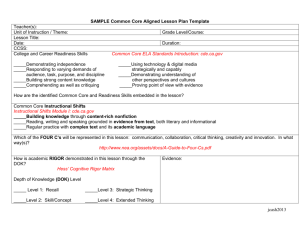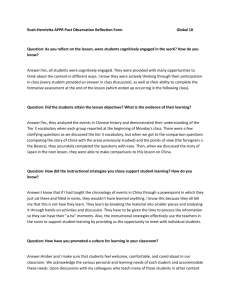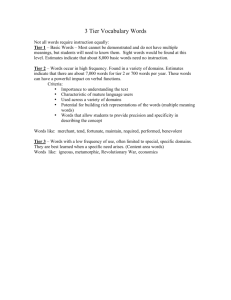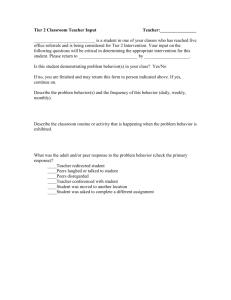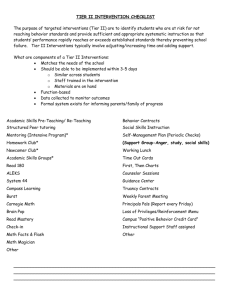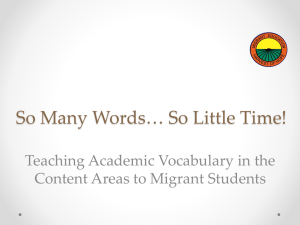Academic Vocabulary Program for Wood Oaks
advertisement
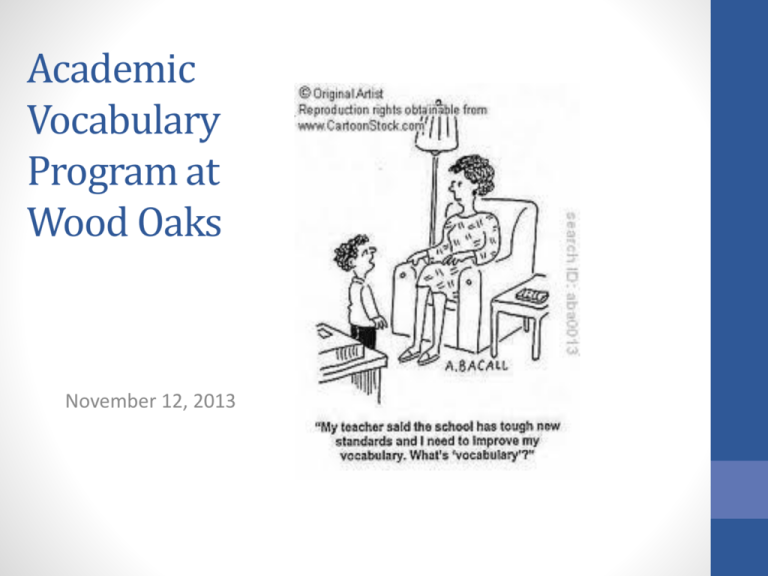
Academic Vocabulary Program at Wood Oaks November 12, 2013 Goals • Learn about the school-wide vocabulary initiative at Wood Oaks • Explain Tier 2 Academic Vocabulary • Share the District 27 model for explicit vocabulary instruction • Develop department vocabulary words to be used in the school-wide vocabulary program It’s all about the vocabulary? • Good Math Vocabulary, Xtra Normal School wide vocabulary program Share Word of the Week on the announcements Introduce Word Wall in the Library Hallway Provide Vocabulary Bookmarks for students Guess the mystery words around the school Share various vocabulary games and activities Highlight teacher vocabulary activities Why the focus on Academic Vocabulary • CCSS focuses on Academic Vocabulary. • Vocabulary is a relative weakness in the District. • We want to make Wood Oaks a vocabulary rich school. • We need to explicitly teach vocabulary to students not merely through a vocabulary program but in all contents. What is Academic Vocabulary? Academic vocabulary is the vocabulary that is critical to understanding the concepts taught in school. The strongest action a teacher can take to ensure that students have the academic background knowledge to understand the content is to provide direct vocabulary instruction. Academic Vocabulary: Three Tiers of Words Tier 1: Basic vocabulary words: baby, book, sad, run Tier 2: General academic words: High frequency; multiple meanings; occur in many contents; commonly found in texts: precise, industrious, measure, democracy Tier 3: Content-specific words: Specific to a particular domain or field of study: isotope, trapezoid, peninsula, personification Vocabulary Makes a Difference • The size of a student’s vocabulary is directly related to achievement. • Data shows there is a 4,500 – 6,000 vocabulary word difference between 25th and 50th percentile students on standardized assessments • Takes the average learner 12 times hearing and using the word before it becomes part of their natural speech. • For students to comprehend, they should be able to read with 90% accuracy and encounter only 1 word in 20 that is unfamiliar. What makes successful vocabulary instruction? A successful approach to vocabulary instruction involves directly explaining the meanings of words along with thoughtprovoking, playful and interactive follow-up. Common Misconceptions 1. Definitions do the trick. 2. Weekly lists are effective. 3. Teachers should teach all the hard words, especially the words in bold or italics. 4. Word learning is not enjoyable. 5. Merely mentioning word meanings assumes that you have therefore taught them. Instructional routine for introducing vocabulary: Anita Archer method 1. Introduce the word 2. Give the meaning of the word 3. Illustrate with examples 4. Check students understanding Instructional Routine for Vocabulary; adapted from Anita Archer Step 1. Introduce the word humiliate Display the word. • Read the word and have the students repeat the word. • If the word is difficult to pronounce or unfamiliar have the students repeat the word a number of times. “ The word is humiliate. What is the word?” Students repeat the word. Humiliate is an action word, a verb. 12 Instructional Routine for Vocabulary (continued) Step 2. Teacher introduces the meaning of the word. Provide a student-friendly definition. When someone says or does something to make you feel embarrassed or stupid, he humiliates you. or Provide the dictionary definition. To lower the pride, dignity, or self-respect 13 Instructional Routine for Vocabulary Step 3. Illustrate the word with examples. • Fans shouted very mean things to Jackie Robinson. • They humiliated him. • Fans threw food on Jackie's uniform to embarrass him. They humiliated him. • For an athlete, it was an unprecedented humiliation. Instructional Routine for Vocabulary Step 4. Check students’ understanding: orally or in writing Criteria for identifying Tier 2 words • Is the word critical for understanding? • Does the word appear frequently in texts? • Is the word used in multiple contents? • Does the word relate to other words students know or are learning? Tier 2 words often have multiple meanings. Department Tasks • Brainstorm with your department and determine 6-8 Academic Vocabulary words that are important to your content which meet the criteria for Tier 2 Academic Vocabulary. • On the strips provided, write 6-8 words, one on each strip, to be used for the Word Wall or for other Wood Oaks school-wide vocabulary activities. • Create a simple activity or direct instruction technique to share with the group for one of the Tier 2 words important in your content. • What can your department or the school do to promote vocabulary?
